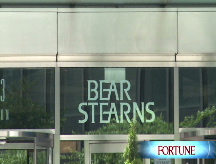Wall Street's tax problem
Taxing "carried interest" as ordinary income could mean a smaller payday for private equity firms and hedge funds. Critics warn of unintended consequences.
NEW YORK (CNNMoney.com) -- Hoping to help plug the gaping hole in the nation's deficit, the Obama administration is looking for a little help from an unlikely source: the financial services industry.
One key item embedded within the White House's 142-page proposed budget is a tax increase on what is known in the private equity and hedge fund industries as "carried interest." This refers to the portion of their fund's profits that some managers receive as compensation.
For decades, managers paid the capital gains tax rate of just 15% on carried interest. When it was first designed, the thinking was that the lower tax rate would encourage long-term investments and ultimately fuel economic growth.
The proposed change, however, would tax this compensation as ordinary income, bringing the rate up to 35% or more.
The proposal, which would not go into effect until 2011, is expected to generate over $2.7 billion in tax revenue during its first year, and a combined $14.7 billion through fiscal year 2014, according to White House estimates.
Such changes, which have been debated amongst members of Congress in recent years, would represent a major setback for a many investment-related industries, including private equity firms and venture capitalists.
In better economic times, when those industries were thriving, carried interest typically represented the largest chunk of a fund manager's compensation. And being taxed at a lower rate only made their payday that much sweeter.
One study published by a Congressional committee in 2008 estimated that the tax-favored treatment of carried interest would save private equity and hedge fund managers $31 billion over the next 10 years.
With that in mind, some critics have argued that the way these types of partnerships are currently taxed amounts to nothing more than a subsidy from fellow taxpayers.
In addition, the lower tax rate may have encouraged many of these fund managers to take bigger risks in search of higher returns when credit was cheap.
"This is something, in a small way, that probably contributed a little bit to the bubble," said Joseph Bankman, a professor of law and business at Stanford University.
Industry groups, however, have been quick to point out that making changes to the way carried interest is currently taxed is fraught with potentially disastrous consequences.
Among those is the potential for a "brain drain" within the industry, the notion that the best and brightest would no longer be interested in working for these types of funds if they didn't have the promise of large financial incentives.
Other groups, such as the National Venture Capital Association, have argued that raising the tax would also discourage long-term, high-risk investments and potentially stifle U.S. economic growth.
It is also worth noting that many large institutional investors, such as university endowments and pension funds, have benefited from impressive hedge fund and private equity returns over the years.
Mark Luscombe, federal tax analyst at CCH, Inc., added that any changes could also raise questions about tax fairness.
Many oil and gas companies, as well as biotech firms for example, are typically structured as partnerships and have their carried interest taxed at the capital gains rate as well.
It is still not clear if the White House is seeking to change the tax rate on carried interest for all partnerships or not, but there are signs that a change may be focused only on investment-related industries.
"How do you rationalize that?" said Luscombe.
Those claims aside, the carried interest proposal seems likely to make its way into the final budget since it appears to have the support of the White House and many members of the Democratically-controlled Congress as well.
At the same time, private equity shops and hedge funds will likely find little sympathy among the American public after taxpayers pumped billions of dollars into ailing banks and Wall Street firms.
Nevertheless, industry groups have been lobbying lawmakers in the hopes of preventing any changes to how carried interest is taxed. And large investment firms have had a lot of success beating back the threat of regulatory reform in recent years.
Hedge funds, for example, thwarted an attempt by the Securities and Exchange Commission in 2006 that would have required them to register as investment advisers.
"You never know," said Stanford's Bankman. "On the other hand, people are a little upset with the titans of industry these days." ![]()


